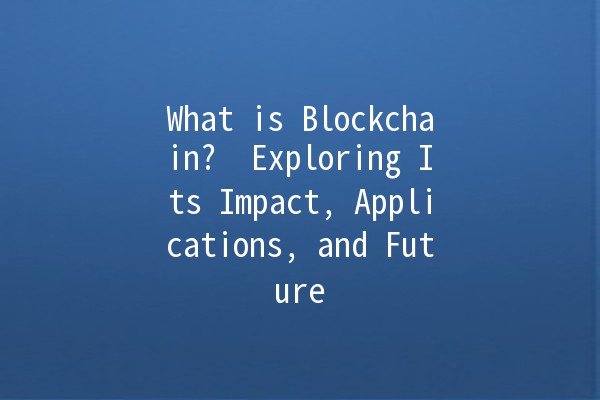
to Blockchain Technology
Blockchain is a revolutionary technology that creates a secure and transparent way to store and share data. Originally designed to support cryptocurrencies like Bitcoin, its applications have since expanded far beyond digital currencies. At its core, a blockchain is a decentralized, distributed ledger that records transactions across many computers in such a manner that the registered transactions cannot be altered retroactively.
Key Characteristics of Blockchain

Enhancing Productivity with Blockchain: 5 Practical Tips
Adopting blockchain technology can significantly enhance productivity in various sectors. Here are five practical tips and examples of how organizations can leverage blockchain to improve their operations.
Application: Businesses can utilize blockchain to track products from origin to delivery, ensuring transparency at every step.
Example: Companies like Walmart use blockchain to trace food products through their supply chain. This allows them to quickly identify contamination sources and reduce waste, which can save both time and resources.
Application: Blockchain’s immutability can help prevent fraud by providing a secure platform for recording transactions.
Example: In the art world, blockchain technology is used to authenticate artworks. Each piece of art can have a digital certificate stored on the blockchain, which verifies its authenticity and ownership history, thereby reducing the risk of forgery.
Application: Smart contracts, which are selfexecuting contracts with the terms of the agreement directly written into code, can automate numerous processes.
Example: In real estate, smart contracts can automate the renting process. Once specific conditions are met, such as the transfer of funds, the smart contract automatically updates the ownership records, cutting down on paperwork and processing time.
Application: Blockchain can provide a secure method of managing identities, addressing the challenges of identity theft and fraud.
Example: The ID2020 Alliance is utilizing blockchain to offer digital IDs for refugees. This helps them access services securely while ensuring their privacy and identity are protected.
Application: Blockchain enables direct transactions between parties without the need for intermediaries, leading to cost savings and faster transactions.
Example: Decentralized finance (DeFi) platforms allow users to lend and borrow cryptocurrency directly with each other using smart contracts, eliminating the need for banks and financial institutions.
RealWorld Applications of Blockchain Technology
ancial Services
The financial sector has been one of the earliest adopters of blockchain technology. Blockchain enables faster transactions, lowers costs, and reduces the risk of fraud. Companies like Ripple facilitate international money transfers using blockchain, reducing the time it takes to send money from one country to another from days to mere seconds.
Healthcare
In healthcare, blockchain can improve the management of patient data by securely storing medical records on a decentralized ledger. This ensures that patient data is accessible only to authorized personnel while protecting it from unauthorized access. For instance, companies like MedRec are harnessing blockchain to give patients control over their medical records, enabling easier sharing with different healthcare providers.
Voting Systems
Blockchain technology can enhance democratic processes by ensuring secure and transparent voting systems. Countries like Estonia have implemented blockchainbased voting systems, allowing citizens to cast their votes online securely while maintaining the anonymity of their choices.
Energy Distribution
Decentralized energy grids powered by blockchain can help facilitate the peertopeer sharing of energy. For example, when homeowners generate excess energy through solar panels, they can sell it directly to their neighbors using blockchain technology, fostering a more sustainable energy ecosystem.
Intellectual Property Protection
Blockchain provides artists and creators with a platform to protect their intellectual property. By registering their work on a blockchain, creators can verify ownership and prevent unauthorized use, which is especially important in the digital age where content can be easily copied and shared.
Common Questions About Blockchain
Blockchain's security comes from its decentralized nature, cryptographic protections, and consensus mechanisms. Since data is distributed across multiple nodes, it becomes extremely difficult for hackers to alter information without the consensus of the majority. Moreover, each block is linked to the previous one through cryptographic hashes, creating a secure chain.
Blockchain offers an alternative to traditional banking systems by providing decentralized financial services that are often faster and cheaper. It reduces reliance on intermediaries, which can lower transaction costs and increase access to financial services for unbanked populations globally.
While the data stored on a blockchain is highly secure, challenges still exist, particularly with private blockchains or smart contracts. However, the underlying structure of public blockchains like Bitcoin remains incredibly secure against hacking attempts due to their decentralized nature.
The energyintensive process of mining in certain blockchains, especially those using Proof of Work, raises environmental concerns. However, new consensus mechanisms like Proof of Stake are being developed to reduce energy consumption and improve sustainability in blockchain operations.
No, blockchain is the technology that enables cryptocurrencies to operate. While cryptocurrencies like Bitcoin and Ethereum are built on blockchain technology, blockchain has many applications beyond digital currencies, including supply chain management, healthcare, and more.
To begin utilizing blockchain technology, it’s crucial to identify specific use cases for your business. Educate yourself and your team about the technology, explore potential blockchain platforms, and assess how it can be integrated within your existing processes. Also, consider consulting with experts or partnering with blockchain firms for guidance.
Blockchain technology presents a transformative potential for numerous industries by improving transparency, security, and efficiency. As organizations continue to explore its applications, understanding the fundamentals of blockchain becomes essential for harnessing its full capabilities. Whether enhancing supply chains or securing digital identities, the potential for blockchain is boundless, and its impact on the future will be substantial.

